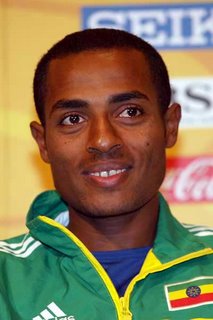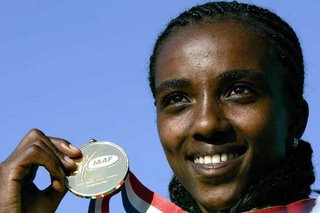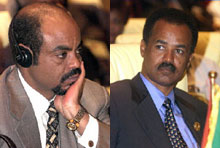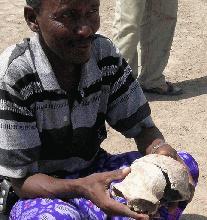Ethiopia "at Crossroads," Warns U.S. Official
Deputy Assistant Secretary Yamamoto testifies to Congress
Ethiopia is "currently at a crossroads" -- it can continue to move forward or it can lapse into the sort of government that is best encountered in the history books, Deputy Assistant Secretary of State Donald Yamamoto told the U.S. Congress March 28.
In testimony before the House Subcommittee on Africa, Global Human Rights and International Operations, Yamamoto said, "It is incumbent upon Prime Minister Meles, his government and the various elements of the multifaceted opposition to demonstrate to the world, but, more importantly, to Ethiopians, the sincerity of their professed commitment to democracy through their actions as well as their words."
Yamamoto was called to Capitol Hill to brief the subcommittee on Ethiopia just hours before departing for that country. The deputy assistant secretary called Ethiopia's May 15, 2005, election "historic" and said it "considerably enhanced the democratic consciousness of the people of Ethiopia."
He also told the lawmakers the 2005 election was "much improved over 2000, which had been a great improvement over the 1995 election."
The United States, he added, is "committed to ensuring that the 2010 elections build on the progress of the 2005 elections, in moving toward transparent elections, responsive government and greater power sharing."
That said, he said Ethiopia's post-2005 election problems highlight the need for capacity building and further reform. "Despite our belief that election results overall were generally credible, the United States was deeply concerned about the 31 seats that went to a re-vote on August 21," he told the lawmakers.
Yamamoto said the ruling party won all 31 seats in that re-vote, even among constituencies where the opposition had won a significant majority during the May 15 balloting.
Of even greater concern, he said, was the violence that erupted on June 8, 2005, and November 1, 2005, which led to the arrests of thousands of people after the elections and the detention of 128 Coalition for Unity and Democracy and civil society leaders.
Following is the text of Yamamoto's statement, as prepared for delivery:
(begin text)
Testimony by Deputy Assistant Secretary Donald Yamamoto
Bureau of African Affairs, U.S. Department of State
"Ethiopia's Troubled Internal Situation"
House International Relations Committee
Subcommittee on Africa, Global Human Rights and International Operations
Chairman Christopher H. Smith
March 28, 2006, 2:00 p.m.
INTRODUCTION
Chairman Smith, members of the subcommittee, I am honored to testify before you today on the internal political situation in Ethiopia. As Africa's second most populous nation, Ethiopia has an important part to play in enhancing the stability of East Africa.
The United States believes that democracy is the best form of government for stability -- in Africa and beyond. Free and transparent elections are the best vehicle for citizens to express their wishes and hold their governments accountable. Democracy should be anything but a zero sum game.
Over the last year, Ethiopians have been tempted by the twin promises of freedom and fairness. Expectations were high during last year's campaign season. This marked the first true multiparty election in Ethiopia's 3,000-year history. Results have been mixed, and hopes for progress have been chilled, as the government has clamped down on individuals' right to assemble and journalists' ability to report events. Meanwhile, several elected opposition officials refused to take their seats in Parliament and have been arrested and charged with capital offenses.
In calling for last May's election, Prime Minister Meles moved his country forward. However, the intolerance that followed in the wake of the results and the opposition's response show that the country has more work to do in progressing toward true, mature democracy.
HOPE FOR DEMOCRACY
Speaking at the Freer Gallery before the G-8 summit last June, President Bush remarked that "the whole world will benefit from prosperity and stability on the African continent. And the peoples of Africa deserve the peace and freedom and opportunity that are the natural rights of all mankind."
The Administration firmly believes in the primacy of democracy. So do the American people and this Congress. Democratic governments will naturally reflect the local cultures and traditions of voters, but this form of government is the single best way to account not only for the needs and wishes of large groups of people, but also for those holding minority viewpoints.
Liberty improves lives, and fair elections and personal liberty protections are universal values. Our goal is to encourage all governments to be responsive to their people and respectful of human dignity. The United States raises these points in the spirit of partnership.
There is every reason to believe that Ethiopians want responsive leadership, and the U.S. Government supports the efforts of students and activists to have their voices heard. As President Bush said in the same speech last June, "All who live in Africa can be certain, as you seize this moment of opportunity, America will be your partner and your friend."
A NEW CHAPTER
The May 15, 2005, elections were momentous and offered the people of Ethiopia the prospect of an important step toward democratic rule and responsive government. The pre-election assessment was impressive. Nearly 26 million people registered to vote, 48% of whom were women. In total, 85% of all eligible voters registered, marking a significant increase over the last election in 2000.
Elections for the lower house featured 1,847 candidates competing for 547 seats. Compared to 2000, this was an increase in participation greater than 80%. Election observers from the United States (U.S.) and European Union (EU) recognized the National Electoral Board for its excellent job registering voters and candidates, and preparing for the elections. Even the state-managed media coverage was considered fair, giving the opposition 56% of the airtime exposure, according to the EU report, while the ruling party received 44% of the coverage.
The opposition parties, much to their own surprise -- and the shock of the ruling party -- earned the keys to Addis Ababa's City Hall on election day. The ruling party acknowledged its loss in the capital, as well as losses in most of Ethiopia's other urban centers. The opposition managed to capture 170 seats, mostly in urban areas. This was significantly more than the meager 12 seats it won in 2000. This success is tempered only by the fact that most Ethiopians reside in rural areas.
The United States hailed the outcome of the May election as an affirmation of Ethiopia's political development. For the first time in their long history, Ethiopians had a democratic choice.
ELECTIONS AND POLITICAL TENSION
The great hope inspired by this election soon gave way to political turmoil. On election day and during the post-election period, there were reports of intimidation and harassment and that in some areas, ballot boxes had been improperly secured. From June 2-8, the opposition raised questions about the results for 299 seats. There was a general transportation strike in Addis Ababa June 6-8, and violence led to the deaths of three-dozen and the arrest of over 3,000 people.
The United States condemned the violence and cautioned that hate messages directed against other ethnic groups could further fracture the delicate ethnic balance within Ethiopia. The U.S. Ambassador in Addis Ababa, Ambassador Aurelia Brazeal, worked with her colleagues from the British, Austrian, EU, and other embassies to broker an agreement on June 10 between the opposition and ruling parties to enhance political engagement and resolve seats under dispute.
Since the departure of Ambassador Brazeal, our Charge, Ambassador Vicki Huddleston, and the U.S. Embassy staff have continued actively to reach out to opposition party leaders from the United Ethiopian Democratic Forces (UEDF), Coalition for Unity and Democracy (CUD), and Oromo Federalist Democratic Movement (OFDM). U.S. Embassy staff is working to bridge the political divide separating the opposition parties and the ruling Ethiopian Peoples' Revolutionary Democratic Front (EPRDF). The State Department has also engaged the Ethiopian diaspora in the United States, and the chief opposition leaders, Hailu Shawel, who heads the CUD, and Petros Beyene, head of the UEDF, who have been in the United States.
On numerous occasions, the Assistant Secretary sent me to Addis Ababa to work with the Ethiopian Government and opposition groups in support of U.S. Embassy efforts to encourage a reconciliation of differences between the opposition and the ruling parties, and to discuss ways to improve the political process with the Ethiopian government. We encouraged the opposition parties to take their seats in the Ethiopian Parliament and use their positions as parliamentarians to press for continued political reform and a greater voice for the opposition.
The opposition's stance evolved after May 15, 2005. Their unexpected political gains inspired the confidence to insist on more political control of the process, and they pressed for a review of the 299 seats they lost to the EPRDF. The Administration has encouraged dialogue between the government and opposition parties to resolve the dispute. U.S. government officials have repeatedly stressed that responsible discussions would help enhance confidence and bring about a peaceful resolution. The National Electoral Board of Ethiopia (NEBE), which did a notable job in pre-election efforts, was overwhelmed by post-election tasks. The NEBE clearly requires significant assistance, as it works to build capacity and forge a constructive dialogue between the parties.
Under the existing NEBE process, the Complaints Review Boards (CRB) received 380 complaints of election irregularities and identified 178 cases for the Complaints Investigations Panels (CIP) to investigate. It was unclear why some cases were rejected. The European Union report on the elections asserted that over 90% of the CUD complaints were rejected as opposed to only 30% for the ruling party. It seems clear that the CRB/CIP process did not prove an adequate means for a fair resolution of all electoral disputes.
According to the Carter Center, which monitored the election process along with the European Union, in one-third of the investigations they observed, witnesses appeared frightened or intimidated, and there was credible evidence of intimidation and harassment including beatings and briberies. It is clear that the CRB/CIP is an ad hoc mechanism to review electoral complaints, rather than a reliable process for resolving the Parliamentary seat dispute. The Carter Center recommended that in this instance, and until the NEBE gains the maturity to resolve political disagreements, the opposition refer these cases to the High Court for adjudication.
We commend the work of the Carter Center and note the important work that the European Union carried out under difficult conditions. On the overall assessment of the elections, we agree with the final report, which noted that the elections had credibility and that the majority of the constituency results based on the May 15 polling and tabulation are credible and reflect competitive conditions. Our own assessments support this view.
Despite our belief that elections results overall were generally credible, the United States was deeply concerned about the 31 seats that went to a re-vote on August 21. The ruling party won all 31 seats, even among constituencies where the opposition had won a significant majority during May 15 balloting. Election observers noted that voters were perplexed as to why there was a re-vote and noted a dearth of information and increased presence of security forces at polling stations. Of even greater concern was the violence that erupted on June 8 and November 1, 2005, that led to the arrests of thousands of people after the elections and the detention of 128 CUD and civil society leaders. We objected strongly to the violence and the detentions both publicly through several press statements and privately to the government and the opposition.
Of particular concern to the United States are the early-November arrests of much of the Coalition for Unity and Democracy (CUD) leadership, along with prominent members of civil society, journalists, editors, and publishers. After seven weeks in detention, the Ethiopian government charged 131 individuals with capital offenses of "outrages against the constitution and constitutional order," and, in several cases, "treason" and "attempted genocide." Charges were recently dropped against 18 of the defendants, including five American citizen staff members of Voice of America, who, with five others, were charged in absentia.
In addition to these leaders, Ethiopian authorities detained over 14,000 demonstrators, holding them for as much as nine weeks in detention camps far away from Addis Ababa. While public protests aimed at destabilizing the country are objectionable, there is no excuse for mass arrests and the use of lethal force against civilians who wish to express their opposition to their government.
GLIMMERS OF HOPE
The electoral process of May 15, 2005. was historic and considerably enhanced the democratic consciousness of the people of Ethiopia. It was a much-improved election over 2000, which had been a great improvement over the 1995 election. The United States is committed to ensuring that the 2010 elections build on the progress of the 2005 elections, in moving toward transparent elections, responsive government, and greater power sharing.
That said, the post-2005 election problems point to the need for capacity building and further reform. The Ethiopian government and opposition agree on that score. We are working to help both sides forge a common commitment to work collaboratively toward a shared goal of developing a more democratic political process. We recognize the need for capacity building to strengthen the electoral commission, foster international exchanges that broaden exposure to other political systems, enhance the open and transparent political process -- particularly with regard to Parliamentary procedures that ensure equal participation for opposition members, offer clear and detailed guidance regarding the electoral process, and encourage greater political debate and participation by members of the Ethiopian public.
Over the last year, we have encouraged the opposition parties to continue their political dialogue with the government about the necessity of reform. The Ethiopian citizens who have been detained without charge are of vital concern, and the Administration calls on the Government of Ethiopia to ensure a fair, transparent, and speedy trial for those charged, release of those who have not been charged, and protection of the human rights, health, and safety of all detainees while they remain in detention.
With the engagement of the EU and the Ethiopian government, the opposition and ruling parties have agreed to review parliamentary procedures, the capacity of the NEBE, media law, and the rule of law. The Ethiopian government has also agreed to reviews of domestic political institutions by outside experts from Germany, India, Great Britain, and Canada. The United States will review the media law, and we are working with the EU to encourage elected opposition officials to take their seats in Parliament, and many are. The United States has also engaged with the newly elected Addis Ababa City Counselors and NEBE to enable the opposition to take over City Hall.
We pressed the Ethiopian government to conduct an independent investigation of the violence and the arrests of thousands of civilians in 2005. The completed report from the commission appointed by Parliament is expected soon. We continue to urge the government to apply expeditiously and justly the procedures of the Ethiopian legal process to the cases of the remaining 111 detained CUD and civil society leaders. Resolution of the detention issue would fortify Ethiopia's developing democratic process.
The Administration is also working to ensure the return of the International Republican Institute, the National Democratic Institute, and IFES, all of which were expelled before the May 15 election. These organizations can help with capacity building and political reform.
All of these actions have been undertaken in support of good governance and the primacy of democracy. We believe Ethiopia is heading in the right direction; in order to ensure positive momentum, the United States and the international community needs to work with Ethiopia to cultivate and nurture this process.
CONCLUSION
Ethiopia is currently at a crossroads; it can continue to move forward, or it can lapse into the sort of government that's best encountered in history books. It is incumbent upon Prime Minister Meles, his government, and the various elements of the multifaceted opposition to demonstrate to the world, but, more importantly, to Ethiopians, the sincerity of their professed commitment to democracy through their actions as well as their words. The United States has a role, as a partner and friend, to help Ethiopia's leaders to choose the right path to secure peace, stability, freedom, and democracy for the Ethiopian people.
Some interested groups, both within and beyond Ethiopian borders, seek to undermine what is best for the nation of Ethiopia, in favor of what they perceive to be the best for themselves. They cast stones at their adversaries, while engaging in the very acts they accuse their rivals of pursuing.
The challenge for the United States is to share with our Ethiopian partners -- the government, the opposition, civil society, and the broader public -- the lessons of America's own democratic experiment and impede the subversive effects of those who put their own objectives above those of the Ethiopian people. Through diplomatic persuasion, the United States has succeeded in bringing together the government and some opposition groups for dialogue to establish a more equitable political environment that includes respect for the rule of law. U.S. engagement has helped convince the vast majority of opposition Members of Parliament-elect to take their seats, so that they can challenge the political system from within to improve lasting institutions and make tomorrow better. The United States has supported efforts through which opposition members elected to the Addis Ababa city council sought to assume control of the capital city, in accordance with their electoral mandate.
The United States government remains hopeful that Ethiopia can achieve the democratic and development ideals that its people espouse. I am hopeful that Ethiopia's leaders will allow this to happen, and Ethiopia's friends in the United States stand by ready to help.
(end text)
(Distributed by the Bureau of International Information Programs, U.S. Department of State. Web site: http://usinfo.state.gov)










 John Gatluak Kam, President of UNCONA
John Gatluak Kam, President of UNCONA
















